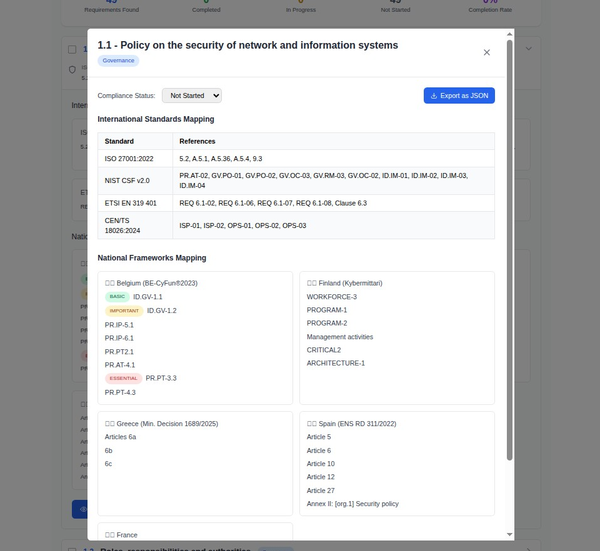Security Assessment Requirements within Compliance Regulations

| Regulation | Description | Source |
|---|---|---|
| Health Insurance Portability and Accountability Act (HIPAA) | Mandates security and privacy standards for protected health information (PHI) and requires covered entities and business associates to conduct risk assessments and implement appropriate security measures. | HHS HIPAA |
| Federal Financial Institutions Examination Council (FFIEC) | Provides guidelines for the financial industry, including banks and credit unions, to assess risks and implement controls to protect customer information and ensure the security of their systems. | FFIEC IT Examination Handbook |
| North American Electric Reliability Corporation (NERC) Critical Infrastructure Protection (CIP) | Focuses on securing the critical infrastructure of the electric power industry, requiring periodic assessments and audits to ensure compliance with cybersecurity standards and protect the reliability of the electrical grid. | NERC CIP |
| Payment Card Industry Data Security Standard (PCI DSS) | Applies to organizations handling credit card data and mandates regular security assessments, including vulnerability scans and penetration testing, to maintain compliance and protect cardholder information. | PCI Security Standards Council |
| General Data Protection Regulation (GDPR) | A comprehensive data protection regulation applicable to organizations processing personal data of individuals in the European Union (EU). It emphasizes privacy risk assessments, implementation of appropriate security measures, and protection of personal data. | European Commission GDPR |
| ISO 27001 (International Organization for Standardization) | An internationally recognized standard for information security management systems (ISMS), requiring organizations to conduct risk assessments and implement controls to manage information security risks effectively. | ISO 27001 |
| APEC CBPR (Asia-Pacific Economic Cooperation Cross-Border Privacy Rules) | A privacy framework that facilitates the cross-border flow of personal data between participating Asia-Pacific economies. It requires organizations to undergo a third-party assessment of their privacy practices to comply with CBPR requirements. | APEC CBPR |
| PIPEDA (Personal Information Protection and Electronic Documents Act) | A Canadian federal law governing the handling of personal information by organizations. It requires privacy risk assessments, protection of personal information, and implementation of appropriate safeguards. | Office of the Privacy Commissioner of Canada |
| NIST Cybersecurity Framework (National Institute of Standards and Technology) | Provides guidelines and best practices for managing and improving cybersecurity risk. It encourages organizations to conduct risk assessments, implement controls, and continuously monitor and assess their cybersecurity posture. | NIST Cybersecurity Framework |
Several regulations within the field of information security require mandatory assessments. Here are a few notable examples:
Health Insurance Portability and Accountability Act (HIPAA):
- HIPAA mandates that covered entities and business associates in the healthcare industry conduct regular risk assessments to identify vulnerabilities and implement appropriate security measures.
Federal Financial Institutions Examination Council (FFIEC):
- FFIEC guidelines require financial institutions, including banks, credit unions, and other financial service providers, to conduct periodic risk assessments and implement controls to protect customer information and ensure the security of their systems.
North American Electric Reliability Corporation (NERC) Critical Infrastructure Protection (CIP):
- NERC CIP standards focus on securing the critical infrastructure of the electric power industry. They require periodic assessments and audits to ensure compliance with cybersecurity standards and protect the reliability of the electrical grid.
Payment Card Industry Data Security Standard (PCI DSS):
- PCI DSS applies to organizations that handle credit card data. It mandates regular security assessments, including vulnerability scans and penetration testing, to maintain compliance and protect cardholder information.
General Data Protection Regulation (GDPR):
- While GDPR does not explicitly require mandatory assessments, it emphasizes the importance of conducting data protection impact assessments (DPIAs) for high-risk data processing activities to assess and mitigate privacy risks.
It's important to note that the requirements and assessment criteria can vary within each regulation, and additional regulations may be specific to certain industries or regions. It's crucial to consult the regulations applicable to your industry and geographical location to ensure compliance and determine the required mandatory assessments.
Several regulations at a global scale impact information security and may require assessments. Here are a few examples:
ISO 27001 (International Organization for Standardization):
- ISO 27001 is an internationally recognized standard for information security management systems (ISMS). While it does not mandate assessments explicitly, it requires organizations to conduct risk assessments and implement controls to manage information security risks effectively.
GDPR (General Data Protection Regulation):
- GDPR is a comprehensive data protection regulation that applies to organizations processing personal data of individuals in the European Union (EU). It emphasizes the need for organizations to assess privacy risks, implement appropriate security measures, and ensure personal data protection.
APEC CBPR (Asia-Pacific Economic Cooperation Cross-Border Privacy Rules):
- APEC CBPR is a privacy framework that facilitates the cross-border flow of personal data between participating Asia-Pacific economies. It requires organizations to undergo a third-party assessment of their privacy practices to ensure compliance with CBPR requirements.
PIPEDA (Personal Information Protection and Electronic Documents Act):
- PIPEDA is a Canadian federal law that governs how organizations handle personal information. It requires organizations to assess privacy risks, protect personal information, and implement appropriate safeguards.
NIST Cybersecurity Framework (National Institute of Standards and Technology):
- The NIST Cybersecurity Framework provides guidelines and best practices for managing and improving cybersecurity risk. While not mandatory, it encourages organizations to conduct risk assessments, implement controls, and continuously monitor and assess their cybersecurity posture.
It's important to note that information security regulations can vary by country and region, and new regulations or updates to existing ones may emerge over time. It is advisable to stay informed about the regulations relevant to your organization's operations and consult legal and compliance professionals to ensure compliance with applicable regulations.





